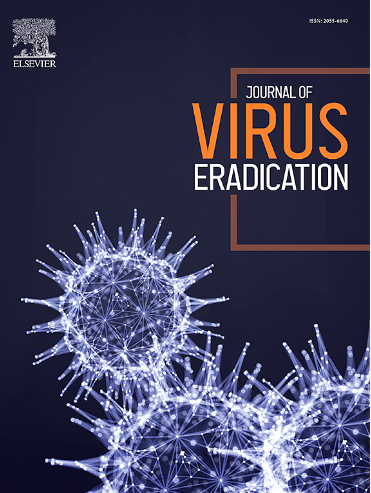埃塞俄比亚帕维地区 12-23 个月大儿童的疫苗接种率及相关因素:横断面研究
IF 3.5
4区 医学
Q2 IMMUNOLOGY
引用次数: 0
摘要
背景尽管医疗机构为儿童提供的疫苗越来越多,但在埃塞俄比亚贝尼尚古尔古穆兹地区的不同地区仍有疫苗可预防疾病爆发和死亡的报道。已设计了各种干预措施,为每个适龄儿童提供疫苗。但有关贝尼尚古尔-古穆兹地区,尤其是帕维地区 12-23 个月大儿童全面疫苗接种覆盖率及相关因素的信息仍然有限。方法 从 2022 年 4 月 1 日至 30 日,在 750 名参与者中开展了一项基于社区的横断面研究。研究对象采用简单随机抽样技术选出。采用结构化问卷收集数据。数据经编码后输入 SPSS 统计软件 23.0。采用双变量和多变量逻辑回归分析来评估与儿童疫苗接种状况相关的因素。研究结果显示,542 名儿童(72.3%)(95 % CI:68.9, 75.2)接种了疫苗。与全面接种率明显相关的因素包括:有工作的母亲(AOR = 0.53,95 % CI:0.29,0.95)、产前护理(ANC)随访(AOR = 1.74,95 % CI:1.00,3.03)、产后护理(PNC)随访(AOR = 6.19,95 % CI:3.62,10.56)、医疗机构分娩(AOR = 4.70,95 % CI:1.90,11.66)、儿童出生顺序(AOR = 0.53,95 % CI:0.29,0.95)。结论这项研究表明,在 12-23 个月大的儿童中,全面疫苗接种覆盖率明显偏低。与全面接种率较高明显相关的因素包括母亲的职业、ANC就诊次数、PNC就诊次数、孩子的出生顺序、分娩地点、母亲对疫苗接种计划的了解程度以及母亲的TT疫苗接种情况。这些研究结果凸显了产妇特征、医疗保健使用模式和产妇知识对该人群儿童疫苗接种的多方面影响。本文章由计算机程序翻译,如有差异,请以英文原文为准。
Vaccines coverage and associated factors among children aged 12–23 months in the Pawie district, Ethiopia: A cross-sectional study
Background
Although access to vaccines for children is increasing at healthcare facilities, outbreaks of vaccine preventable diseases and deaths have been reported in different areas of the Benishangul Gumuz region, in Ethiopia. Various interventions have been designed to provide vaccines for each child at an appropriate age. Still there is limited information on full vaccination coverage and associated factors among children aged 12–23 months in the Benishangul-Gumuz region, particularly in the Pawie district.
Method
A community-based cross-sectional study design was used from April, 1–30, 2022 among 750 participants. Study populations were selected using a simple random sampling technique. Data was collected using structured questionnaires. Data was coded and entered into the SPSS Statistics 23.0. Bi-variable and multivariate logistic regression analyses were used to assess factors associated with the children vaccination status. Variables with p-value <0.05 were considered significantly associated with the outcome variable.
Result
The results of this study revealed that 542 (72.3 %) (95 % CI: 68.9, 75.2) of the children were fully vaccinated. Factors significantly associated with full vaccination coverage included employed mothers (AOR = 0.53, 95 % CI: 0.29, 0.95), antenatal care (ANC) follow-up (AOR = 1.74, 95 % CI: 1.00, 3.03), post-natal care (PNC) follow-up (AOR = 6.19, 95 % CI: 3.62, 10.56), health institution delivery (AOR = 4.70, 95 % CI: 1.90, 11.66), birth order of children (AOR = 3.63, CI: 2.00, 6.59), maternal tetanus toxoid (TT) vaccination (AOR = 3.05, CI: 1.36, 6.86) and knowledge of vaccination schedule (AOR = 2.49, 95 % CI: 1.19, 5.21).
Conclusions
This study revealed that among children aged 12–23 months, full vaccination coverage was notably low. Factors significantly associated with higher rates of full vaccination included mothers’ occupation, attendance at ANC visits, PNC visits, birth order of children, place of delivery, maternal awareness of vaccination schedules, and maternal TT vaccination status. These findings highlight the multifaceted influences of maternal characteristics, healthcare use patterns, and maternal knowledge on childhood vaccination in this population.
求助全文
通过发布文献求助,成功后即可免费获取论文全文。
去求助
来源期刊

Journal of Virus Eradication
Medicine-Public Health, Environmental and Occupational Health
CiteScore
6.10
自引率
1.80%
发文量
28
审稿时长
39 weeks
期刊介绍:
The Journal of Virus Eradication aims to provide a specialist, open-access forum to publish work in the rapidly developing field of virus eradication. The Journal covers all human viruses, in the context of new therapeutic strategies, as well as societal eradication of viral infections with preventive interventions.
The Journal is aimed at the international community involved in the prevention and management of viral infections. It provides an academic forum for the publication of original research into viral reservoirs, viral persistence and virus eradication and ultimately development of cures.
The Journal not only publishes original research, but provides an opportunity for opinions, reviews, case studies and comments on the published literature. It focusses on evidence-based medicine as the major thrust in the successful management of viral infections.The Journal encompasses virological, immunological, epidemiological, modelling, pharmacological, pre-clinical and in vitro, as well as clinical, data including but not limited to drugs, immunotherapy and gene therapy. It is an important source of information on the development of vaccine programs and preventative measures aimed at virus eradication.
 求助内容:
求助内容: 应助结果提醒方式:
应助结果提醒方式:


